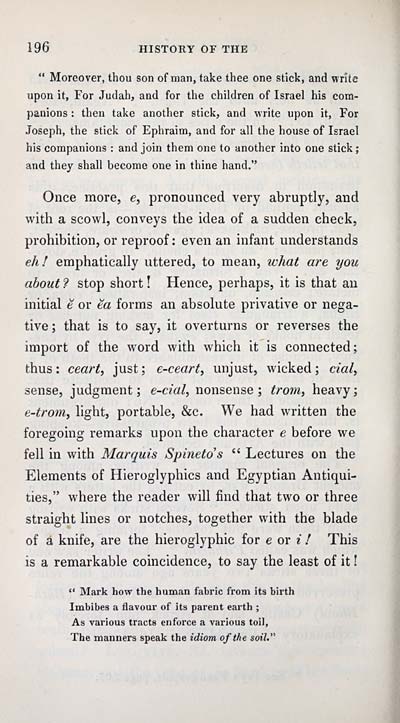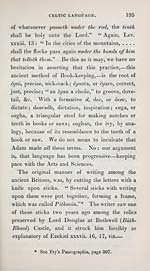Download files
Complete book:
Individual page:
Thumbnail gallery: Grid view | List view

196 HISTORY OF THE
" Moreover, thou son of man, take thee one stick, and write
upon it, For Judah, and for the children of Israel his com-
panions : then take another stick, and write upon it, For
Joseph, the stick of Ephraim, and for all the house of Israel
his companions : and join them one to another into one stick ;
and they shall become one in thine hand."
Once more, e, pronounced very abruptly, and
with a scowl, conveys the idea of a sudden check,
prohibition, or reproof : even an infant understands
eh! emphatically uttered, to mean, what are you
about ? stop short ! Hence, perhaps, it is that au
initial è or èa forms an absolute privative or nega-
tive ; that is to say, it overturns or reverses the
import of the word with which it is connected;
thus : ceart, just ; e-ceart, unjust, wicked ; cm/,
sense, judgment ; e-cial, nonsense ; trom.y heavy;
e-trom^ hght, portable, &c. We had written the
foregoing remarks upon the character e before we
fell in with Marquis Spinetd's " Lectures on the
Elements of Hieroglyphics and Egyptian Antiqui-
ties," where the reader will find that two or three
straight hnes or notches, together with the blade
of à knife, are the hieroglyphic for e or i ! This
is a remarkable coincidence, to say the least of it !
<' Mark how the human fabric from its birth
Imbibes a flavour of its parent earth ;
As various tracts enforce a vaiious toil,
The manners speak the idiom ofthe soil,"
" Moreover, thou son of man, take thee one stick, and write
upon it, For Judah, and for the children of Israel his com-
panions : then take another stick, and write upon it, For
Joseph, the stick of Ephraim, and for all the house of Israel
his companions : and join them one to another into one stick ;
and they shall become one in thine hand."
Once more, e, pronounced very abruptly, and
with a scowl, conveys the idea of a sudden check,
prohibition, or reproof : even an infant understands
eh! emphatically uttered, to mean, what are you
about ? stop short ! Hence, perhaps, it is that au
initial è or èa forms an absolute privative or nega-
tive ; that is to say, it overturns or reverses the
import of the word with which it is connected;
thus : ceart, just ; e-ceart, unjust, wicked ; cm/,
sense, judgment ; e-cial, nonsense ; trom.y heavy;
e-trom^ hght, portable, &c. We had written the
foregoing remarks upon the character e before we
fell in with Marquis Spinetd's " Lectures on the
Elements of Hieroglyphics and Egyptian Antiqui-
ties," where the reader will find that two or three
straight hnes or notches, together with the blade
of à knife, are the hieroglyphic for e or i ! This
is a remarkable coincidence, to say the least of it !
<' Mark how the human fabric from its birth
Imbibes a flavour of its parent earth ;
As various tracts enforce a vaiious toil,
The manners speak the idiom ofthe soil,"
Set display mode to: Large image | Transcription
Images and transcriptions on this page, including medium image downloads, may be used under the Creative Commons Attribution 4.0 International Licence unless otherwise stated. ![]()
| Early Gaelic Book Collections > Hew Morrison Collection > Adhamh agus Eubh, no Craobh Sheanachais nan Gàël > (326) |
|---|
| Permanent URL | https://digital.nls.uk/76900628 |
|---|
| Description | A selection of items from a collection of 320 volumes and 30 pamphlets of literary and religious works in Scottish Gaelic. From the personal library of Hew Morrison, the first City Librarian of Edinburgh. |
|---|
| Description | Selected items from five 'Special and Named Printed Collections'. Includes books in Gaelic and other Celtic languages, works about the Gaels, their languages, literature, culture and history. |
|---|

